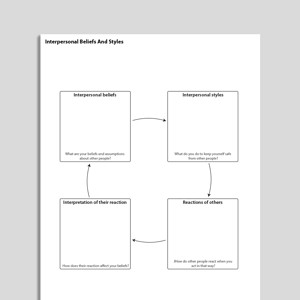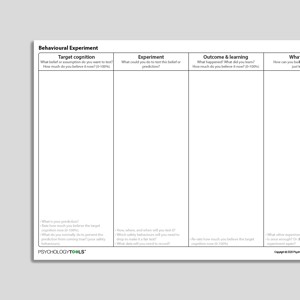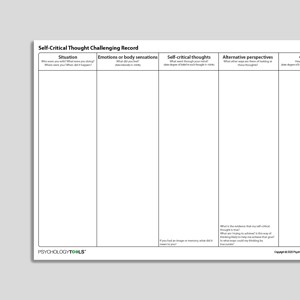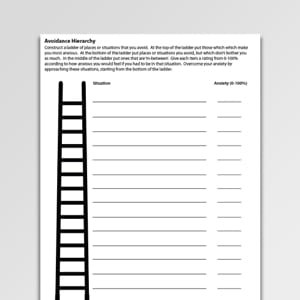Assertiveness Training Worksheets
Assertive behaviors are those that enable an individual to act in their own best interests, to stand up for themselves without undue anxiety, to express honest feelings comfortably, or to exercises their own rights without denying the rights of others (paraphrased from Alberti & Emmons, 1974). Deficits in assertiveness are associated with a range of problems including low self-esteem, anxiety, and depression. Psychologists believe that assertiveness skills—the ability to speak and act assertively—can be taught and learned.
Showing 1 to 16 of 16 results
Evaluating Unhelpful Automatic Thoughts
Evaluating Unhelpful Automatic Thoughts
Boundaries - Self-Monitoring Record
Boundaries - Self-Monitoring Record
Fair Fighting Rules For Resolving Conflict
Fair Fighting Rules For Resolving Conflict
What Do People Think About Themselves (CYP)?
What Do People Think About Themselves (CYP)?
Cognitive Behavioral Model Of Low Self-Esteem (Fennell, 1997)
Cognitive Behavioral Model Of Low Self-Esteem (Fennell, 1997)
Interpersonal Beliefs And Styles
Interpersonal Beliefs And Styles
Unhelpful Thinking Styles (Archived)
Unhelpful Thinking Styles (Archived)
Self Critical Thought Challenging Record
Self Critical Thought Challenging Record
Behavioral Experiment (Portrait Format)
Behavioral Experiment (Portrait Format)
Links to external resources
Psychology Tools makes every effort to check external links and review their content. However, we are not responsible for the quality or content of external links and cannot guarantee that these links will work all of the time.
Assessment
-
The Assertiveness Inventory
| Alberti, Emmons | 1986
- Scale
- Reference Alberti, R.E. and Emmons, M.L. (2017). Your Perfect Right: Assertiveness and Equality in Your Life and Relationships(10th ed.). Oakland, CA: Impact Publishers/New Harbinger Publications.
- Reference Gay, M. L., Hollandsworth, J. G., & Galassi, J. P. (1975). An assertiveness inventory for adults.Journal of Counseling Psychology, 22(4), 340-344.
Information Handouts
- Assertive behaviors: Ideas to keep in mind
- Guide to healthy relationships
- Assertive communication | Centre For Clinical Interventions
- Being assertive (workbook) | Williams | 2000
Information (Professional)
- Being assertive (OCTC Practical Guides) | Helen Kennerley | 2016
- Assertive defense of the self (A more effective treatment focus for social phobia?) | Padesky | 1985
Self-Help Programmes
-
Assert Yourself! (Workbook)
| Centre For Clinical Interventions | 2008
- Module 1: What Is Assertiveness?
- Module 2: How To Recognise Assertive Behavior
- Module 3: How To Think More Assertively
- Module 4: How To Behave More Assertively
- Module 5: Reducing Physical Tension
- Module 6: How To Say "No" Assertively
- Module 7: How To Deal Assertively With Criticism
- Module 8: How To Deal With Disappointment Assertively
- Module 9: How To Give And Receive Compliments Assertively
- Module 10: Putting It All Together
Worksheets
- Cognitive Interpersonal Cycle Worksheet | Stirling Moorey | 2007
Recommended Reading
- Duckworth, M. P. (2009).Assertiveness skills and the management of related factorsin O’Donohue, W. T., Fisher, J. E., & Hayes, S. C. (Eds.). (2004).Cognitive behavior therapy: Applying empirically supported techniques in your practice. John Wiley & Sons.
- Heimberg, R. G., & Becker, R. E. (1981). Cognitive and behavioral models of assertive behavior: Review, analysis and integration.Clinical Psychology Review,1(3), 353-373.
- Speed, B. C., Goldstein, B. L., & Goldfried, M. R. (2018). Assertiveness training: A forgotten evidence‐based treatment.Clinical Psychology: Science and Practice,25(1), e12216.
What Is Assertiveness?
Signs and Symptoms of Un-assertiveness
Assertiveness is a skill. Being assertive means being able to stand up for your own rights, or those of others, in a calm and positive way. People who struggle to be assertive might:find it difficult to stand up for their rights or put across their point of view;
behave passively and comply with the wishes of others;
respond aggressively and fail to consider the views of others.
Psychological Models and Theory of Assertiveness
Heimberg and Becker (1981) review both behavioral and cognitive models of assertive behavior. They argue that a behavioral model of assertiveness is based on four major assumptions:Non-assertive behavior is the result of a deficit in assertiveness skills.
Reinforcement of assertive behavior is an essential part of its development and maintenance.
Different types of assertive behavior are independent from one another and may need to be taught separately.
Assertive behavior is situation-specific.
maladaptive cognitions such as self-statements;
irrational beliefs and negative self-evaluations;
expectations of unwanted results from assertive behavior;
differences in information processing and cognitive flexibility between assertive and non-assertive individuals.
Evidence-Based Psychological Approaches for Increasing Assertiveness
Speed, Goldstein, and Goldfried (2018) review research on assertiveness training and place it within a historical context. They describe how assertiveness training fell out of favor with moves toward a medical model approach to treating psychological difficulties. They review evidence for assertiveness training as a stand-alone intervention. They also review the role of assertiveness within Dialectical Behavior Therapy (DBT) ‘interpersonal effectiveness’ modules, behavioral activation programs, and its fit within committed value-based actions as a part of Acceptance and Commitment Therapy (ACT). They conclude:“Early basic research suggests that assertiveness problems are common among externalizing disorders, such as depression and anxiety, as well as nonclinical problems such as self-esteem and relationship satisfaction, making assertiveness a construct that may play a central role in the maintenance of clinical problems. Importantly, a substantial body of early research supports the efficacy of assertiveness training in improving clinical symptoms, increasing self-esteem, relationship satisfaction, and assertiveness—both broadly and within specific contexts.”
Resources for Working with Assertiveness
Psychology Tools resources available for working therapeutically with assertiveness may include:psychological models of assertiveness
CBT worksheets for assertiveness
self-help programs for assertiveness
References
Alberti, R. E., & Emmons, M. L. (1974). Assert yourself—It’s your perfect right. San Luis Obispo. CA: Impact.
Heimberg, R. G., & Becker, R. E. (1981). Cognitive and behavioral models of assertive behavior: Review, analysis and integration. Clinical Psychology Review, 1(3), 353–373.
Speed, B. C., Goldstein, B. L., & Goldfried, M. R. (2018). Assertiveness training: A forgotten evidence‐based treatment. Clinical Psychology: Science and Practice, 25(1), e12216. https://doi.org/10.1111/cpsp.12216















